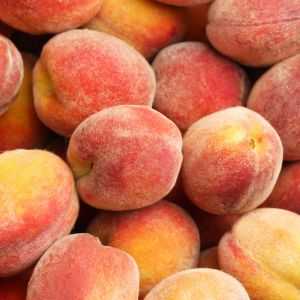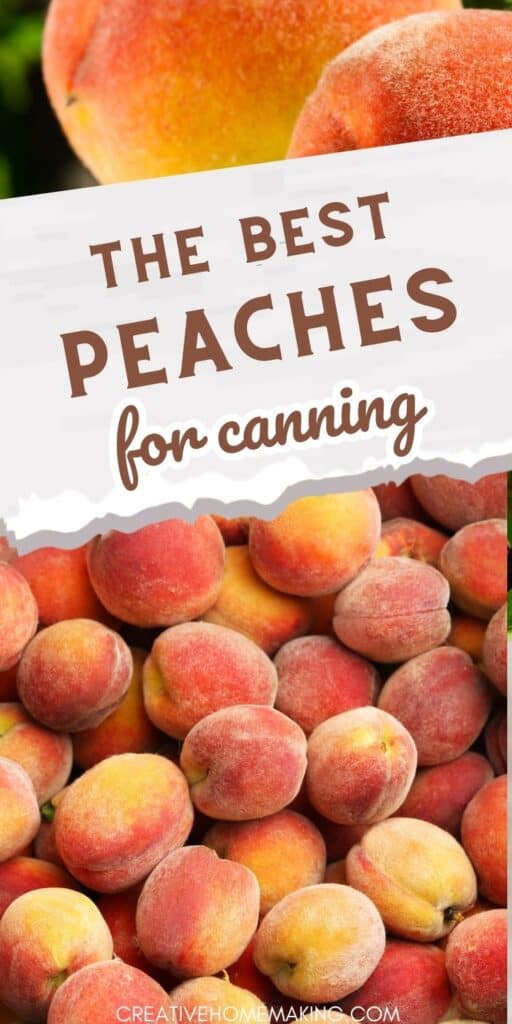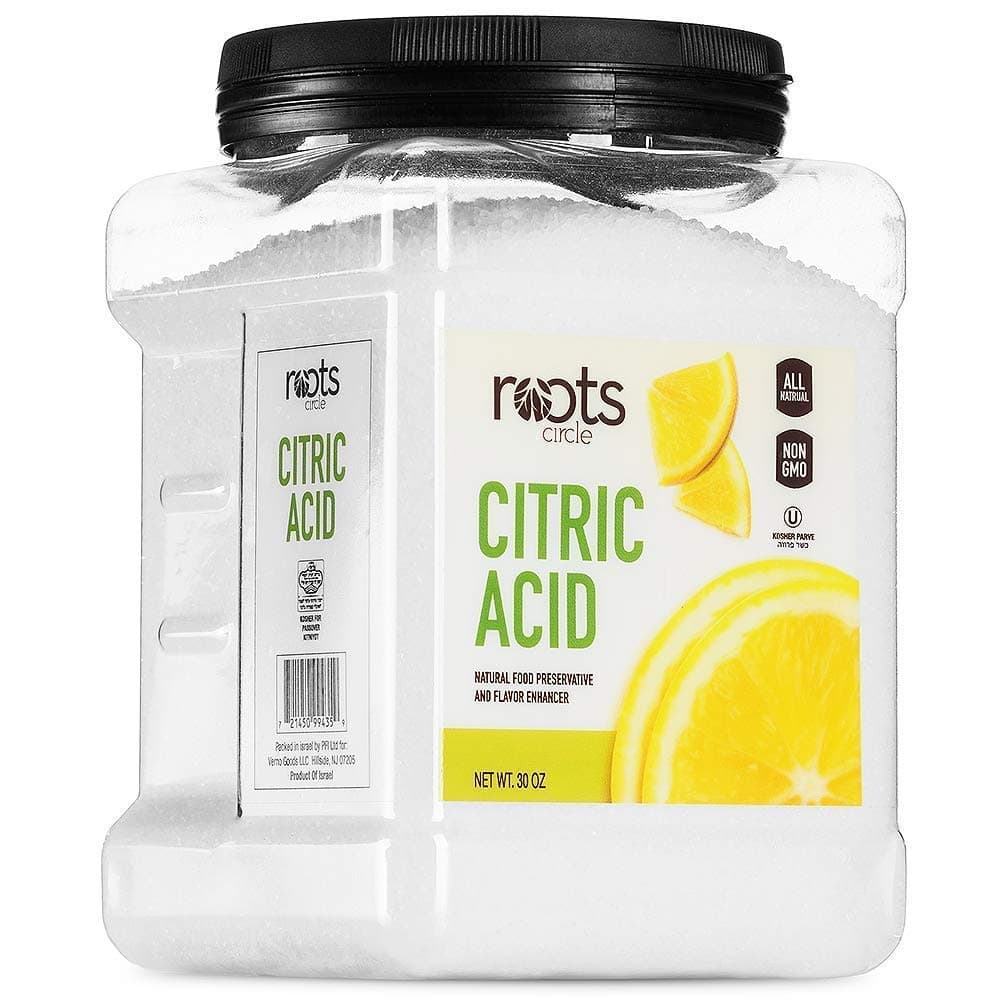Canning peaches is a great way to preserve their sweet, juicy flavor all year round. But not all peaches are created equal when it comes to canning. Some varieties hold up better during the canning process and maintain their texture and flavor. In this article, we will explore the best peaches for canning and provide tips on how to choose and prepare them for the canning process.
This post may contain affiliate links.
When it comes to choosing peaches, it’s important to look for varieties that are firm, not too ripe, and have a high sugar content. Freestone peaches are ideal for canning because their flesh separates easily from the pit, making them easier to work with. Some of the best peach varieties for canning include Elberta, Redhaven, and Hale. These varieties are known for their sweet, juicy flavor and firm texture, which holds up well during the canning process.
Related Article: Canning Peaches: A Beginner’s Guide
Before canning peaches, it’s important to properly prepare them. This includes blanching, peeling, and slicing the peaches, as well as adding sugar and any other desired flavorings. By choosing the right peach variety and following proper preparation techniques, you can enjoy delicious, canned peaches all year round.
Understanding Peaches for Canning
When it comes to canning peaches, choosing the right type of peach is crucial. Not all peaches are created equal, and some are better suited for canning than others.
Freestone vs. Clingstone Peaches
The first thing to consider when selecting peaches for canning is whether they are freestone or clingstone. Freestone peaches are so named because the pit (or stone) is easily removed from the flesh of the fruit. This makes them ideal for canning, as the pit can be easily removed without damaging the flesh. Clingstone peaches, on the other hand, have pits that are firmly attached to the flesh. While they can still be used for canning, it can be more difficult to remove the pit without damaging the fruit.
Related Article: Canning Peach Butter: A Beginner’s Guide
Popular Peach Varieties for Canning
When it comes to specific varieties of peaches, there are a few that are particularly well-suited for canning. Ernie’s Choice, Canadian Harmony, Rio Oso, Gem, and Glohaven are all popular choices for canning. These varieties are known for their firm flesh and sweet flavor, which makes them ideal for preserving.
Choosing the Right Size and Ripeness
When selecting peaches for canning, it’s important to choose fruit that is ripe but not overly soft. Look for peaches that are slightly soft to the touch but still firm. Additionally, the size of the peach can also impact the canning process. Smaller peaches can be easier to handle and fit more easily into jars, while larger peaches may require more preparation before canning.
Green vs. Ripe Peaches
Finally, it’s worth noting that green peaches are not suitable for canning. Peaches need to be fully ripe before they can be preserved, as this ensures that they have the right texture and flavor for canning. If you’re not sure whether your peaches are ripe enough, give them a gentle squeeze. If they yield slightly to pressure, they are likely ready to be canned.
Related Article: 5 Best Peach Canning Recipes
Creating the Perfect Syrup
When it comes to canning peaches, creating the perfect syrup is just as important as selecting the right fruit. The syrup not only adds flavor but also helps preserve the fruit. There are several types of syrup that can be used for canning peaches, each with its own unique flavor and sweetness level.
The most common syrup used for canning peaches is a sugar syrup. This syrup is made by combining sugar and water in a pot and heating until the sugar dissolves. The ratio of sugar to water can vary depending on how sweet you want the syrup to be. For a light sugar syrup, use a ratio of 1:3 (1 cup of sugar to 3 cups of water). If you want to make a medium sugar syrup, use a ratio of 1:2 (1 cup of sugar to 2 cups of water). For a heavy sugar syrup, use a ratio of 1:1 (1 cup of sugar to 1 cup of water).
Related Article: How to Freeze Peaches with Fruit Fresh
Another option for creating a syrup for canning peaches is to use a simple syrup. This syrup is made by combining equal parts sugar and water in a pot and heating until the sugar dissolves. Simple syrup is sweeter than sugar syrup and can be used if you want a sweeter peach.
Grape juice can also be used to create a syrup for canning peaches. Grape juice contains natural sugars and acids that can help preserve the fruit. To make grape juice syrup, combine equal parts grape juice and water in a pot and heat until the mixture comes to a boil.
Lemon juice or citric acid can be added to any syrup to increase the acidity level. This helps preserve the fruit and prevent spoilage. Ascorbic acid can also be used for this purpose.
When creating a syrup for canning peaches, it’s important to keep in mind the sweetness level of the fruit. If the peaches are already very sweet, a lighter syrup may be preferred. If the peaches are tart, a heavier syrup may be needed to balance out the flavors.
Related Article: How to Freeze Peaches for Smoothies
Preventing Browning
When canning peaches, preventing browning is essential to maintaining the appearance and quality of the fruit. Browning occurs when the enzymes in the peaches react with oxygen, causing the flesh to turn brown. This can be prevented by using one or more of the following methods:
- Adding acid: Adding acid to the peaches can help prevent browning. This can be done by adding lemon juice or citric acid to the fruit. The acid lowers the pH of the fruit, making it more difficult for the enzymes to react with oxygen.
- Blanching: Blanching the peaches before canning can help prevent browning. Blanching involves dipping the peaches in boiling water for a short period of time, then immediately transferring them to ice water to stop the cooking process. This helps to inactivate the enzymes that cause browning.
- Using ascorbic acid: Ascorbic acid, also known as vitamin C, can be used to prevent browning. This can be done by adding crushed vitamin C tablets or a commercial anti-browning agent to the fruit. Ascorbic acid works by inhibiting the enzymes that cause browning.
- Keeping the fruit submerged: Keeping the fruit submerged in a solution of water and lemon juice or citric acid can help prevent browning. This is especially important if you are preparing the fruit ahead of time and need to keep it from browning before canning.
When canning peaches, it is important to consider the altitude and pH of the fruit. The acidity of the fruit can affect the safety of the canning process, so it is important to follow proper canning procedures and recipes. Additionally, altitude can affect the temperature at which water boils, which can affect the canning process. It is important to adjust processing times and temperatures based on altitude to ensure that the fruit is properly canned.
Related Article: Canning Peach Pie Filling
Frequently Asked Questions
What are the different types of peaches that are best for canning?
The best peaches for canning are freestone peaches. These peaches are easy to pit and have flesh that separates easily from the pit, making them ideal for canning. Some popular varieties of freestone peaches for canning include Red Haven, Elberta, and Hale.
When is the best time to buy peaches for canning?
The best time to buy peaches is in mid to late summer, when they are at their peak ripeness. Look for peaches that are slightly soft to the touch and have a sweet aroma. Avoid peaches that are too firm or have green spots, as they may not be fully ripe.
Can all types of peaches be canned?
While all types of peaches can technically be canned, not all varieties are created equal. Some peaches have flesh that is too soft or delicate for canning, while others are difficult to pit. Stick with freestone varieties for the best results.
What are the best peaches for making jam?
For making jam, clingstone peaches are a better choice than freestone peaches. Clingstone peaches have flesh that clings to the pit, making them more flavorful and ideal for jam-making. Some popular varieties of clingstone peaches for jam-making include Red Haven, O’Henry, and Cresthaven.
Where can I find freestone peaches for canning near me?
Freestone peaches can usually be found at local farmers’ markets or specialty grocery stores during peach season. Check with your local orchard or fruit stand to see if they have any available for purchase.
Are Red Haven peaches good for canning?
Yes, Red Haven peaches are a popular variety for canning. They have a sweet, juicy flavor and are easy to pit, making them a great choice for beginners. Other popular varieties for canning include Elberta and Hale.





